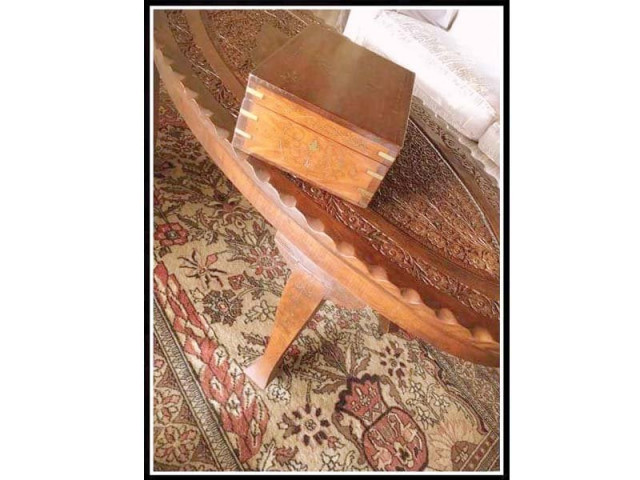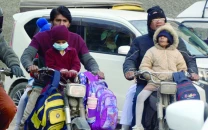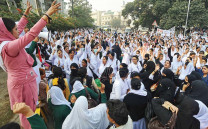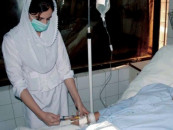French sailor recalls Karachi of over 30 years ago
Yves Lemonnier saw a city that sounds a lot like the one we hear about from our parents

Travelling to Karachi with a French fleet, Yves Lemonnier saw the port city that sounds a lot like the city we hear about from our parents - the friendly smiles on the streets and horse-drawn tongas as the transport of choice. But then he also glimpsed into a Karachi that exists even to this day - the haphazard traffic on the roads and the massive road blocks on MA Jinnah Road. He made three trips to Karachi - in October1 980, then December 1980 and then again in May 1985 and here's what he saw:
Karachi restoration project
It was my first contact with this country and what struck me most at that time was the traffic, which could look quite anarchic for a European. I have a 'Super 8' movie that shows this exactly - the traffic that looks extremely random (at least inside the port area), large vehicles crossing each other randomly from the left and right, no one seems to notice. Eventually, after a few hours, we got used to it. It didn't seem as anarchic anymore.
Everywhere we went, people were very friendly and welcoming.
It was fascinating how taxi drivers stayed with their customers for the entire duration of their stay in the city, and they were only paid on the last day. It seemed natural to them but, for us, it seemed risky. We were anxious that some people in our crew may not be very honest about that.
A traveller to Karachi today can still experience the 'chaotic order' of the city's traffic but I wonder how much friendliness we have left in our smiles. Blame it on the waves of violence that the city experienced from the late 1980s or the dwindling resources that we all seem to fight over, but how many taxi drivers can we find who will willingly spend three days attached to a single passenger and double as their tour guide too?
When he visited Karachi again around Christmas in 1980, Yves and his crew planned a trip to Quaid-e-Azam's mausoleum. A German sailor they had met offered to drive them to the mausoleum, and their ride to Saddar was an experience most visitors can relate to even today:
Each time he [the German sailor] wanted to turn on to MA Jinnah Avenue, we were stopped by the police. He drove us along a parallel street to drop us as near as possible but there were police roadblocks everywhere. We walked across the roadblocks without any trouble but, a few metres away, we saw young people in the traditional dress, drenched in blood. We could hear thuds in cadence over all other noises.
A group of men, who looked quite threatening, came to us. We spoke to them and told them we were French people, and then they told us what was happening. It was a gathering of Shia Muslims, lashing themselves with whips made of chains. Others were beating their chests and that's where the thud was coming from. There were a lot of cars parked along the avenue, all of them showing pictures of Ayatollah Khomeini.
A journey through Karachi’s past and present
Perhaps it was the Karachi of the 1980s but Yves and his crewmate still managed to visit the mausoleum. Mindful of the mourners, they made a short trip inside the mausoleum and then returned to their ship by a taxi.
The same night, we were invited by a guy from the British Consulate. We went there using a horse-drawn carriage and crossed neighbourhoods with no electricity. The only light was coming from the light of the carriage, the road more like a trail. It was, for us, a new discovery of the city streets.
It was not until five years later that Yves made his way back to Karachi, this time greeted by the city neighbourhoods filled with flowers, wide avenues and friendly people. For someone who was in town for only five days, it is funny he got to experience the city's signature water woes.
We had planned to fill our [ship's] water tanks [at the port] when we were told that the breakdown of a dam had cut all provision of water for the entire city. It took us some days to return to sea, eventually filling our tanks after some days of rationing.
Who knew Karachi's now-extinct black-and-yellow taxis were driven by such dedicated ambassadors but Yves met yet another taxi driver, who boasted of the number of French sailors he'd driven around by showing a variety of postcards he had collected.
He drove me to a market for wooden goods and I found some very nice tables for our living room, a jewellery box for my wife and, of course, carpets. When the time came for me to pay the taxi driver on the last day, he asked me if I could pay instead with a bottle of whisky and a cigarette cartridge. But I could only give him those at night cause it was during the month of Ramazan and, as a Muslim friend once told me, 'God doesn't see anything at night'.
I have this very fond memory of the last night before we left. I was invited to a farewell dinner for a member of the French local community and we were invited to a hotel (I cannot recall its name). Only non-alcoholic beverages were served so everyone came with their own bottle of wine or whisky, or anything else with alcohol in it. Funnily enough, none of these were visible on the tables. But one should not have looked under the table! As soon as the waiters left the room, alcohol was freely coming out in glasses.
So much has changed and yet everything sounds the same. The last 30 years have seen Karachi go to hell and back and yet there is that cryptic resilience that seems to make it keep going. If nothing else, let's hope there are still some taxi drivers relentlessly driving across barriers some kind visitors making their way to Karachi.
Translation from French courtesy of Philippe Lemonnier
Published in The Express Tribune, January 12th, 2017.


















COMMENTS
Comments are moderated and generally will be posted if they are on-topic and not abusive.
For more information, please see our Comments FAQ